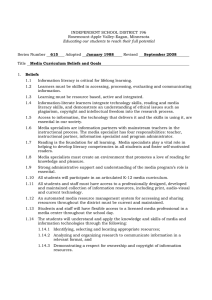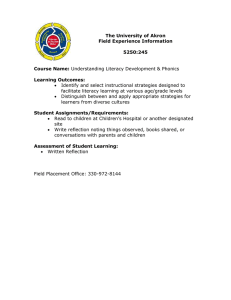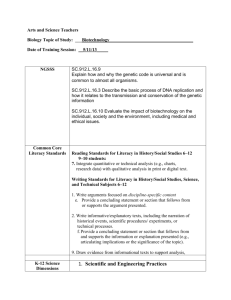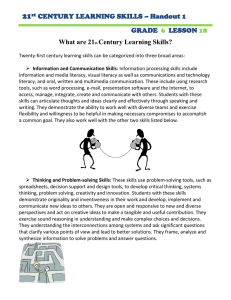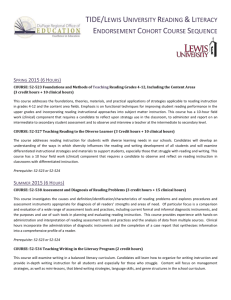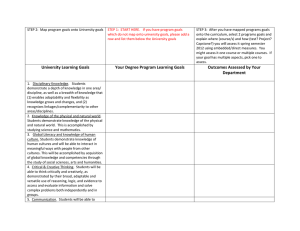Assessment 4
advertisement
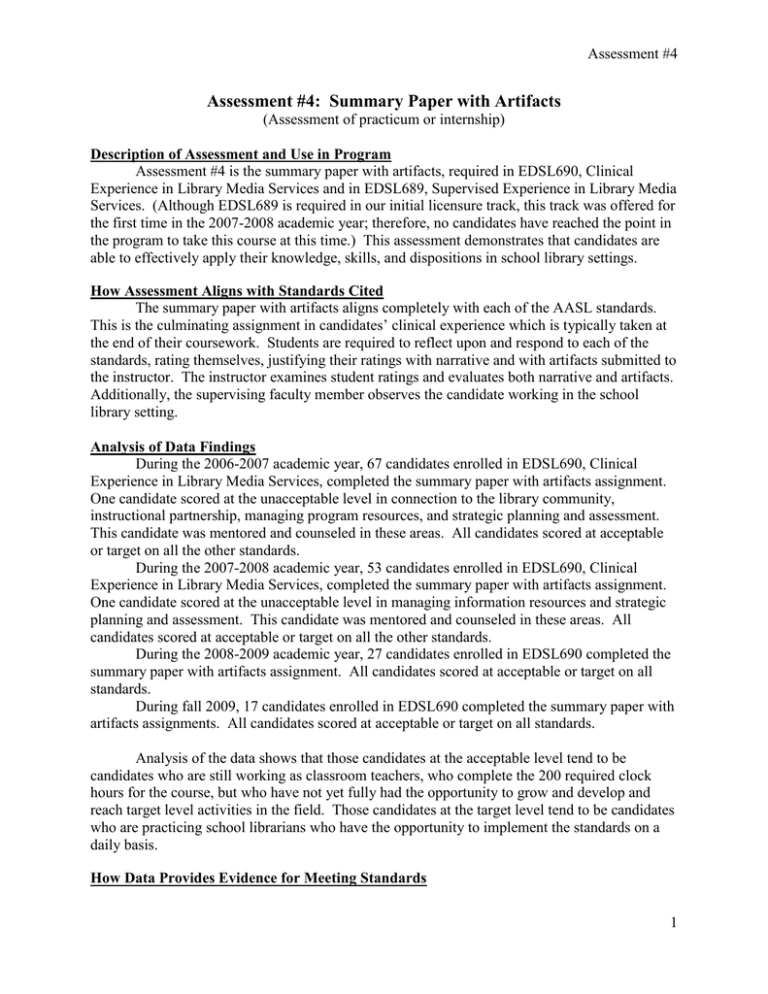
Assessment #4 Assessment #4: Summary Paper with Artifacts (Assessment of practicum or internship) Description of Assessment and Use in Program Assessment #4 is the summary paper with artifacts, required in EDSL690, Clinical Experience in Library Media Services and in EDSL689, Supervised Experience in Library Media Services. (Although EDSL689 is required in our initial licensure track, this track was offered for the first time in the 2007-2008 academic year; therefore, no candidates have reached the point in the program to take this course at this time.) This assessment demonstrates that candidates are able to effectively apply their knowledge, skills, and dispositions in school library settings. How Assessment Aligns with Standards Cited The summary paper with artifacts aligns completely with each of the AASL standards. This is the culminating assignment in candidates’ clinical experience which is typically taken at the end of their coursework. Students are required to reflect upon and respond to each of the standards, rating themselves, justifying their ratings with narrative and with artifacts submitted to the instructor. The instructor examines student ratings and evaluates both narrative and artifacts. Additionally, the supervising faculty member observes the candidate working in the school library setting. Analysis of Data Findings During the 2006-2007 academic year, 67 candidates enrolled in EDSL690, Clinical Experience in Library Media Services, completed the summary paper with artifacts assignment. One candidate scored at the unacceptable level in connection to the library community, instructional partnership, managing program resources, and strategic planning and assessment. This candidate was mentored and counseled in these areas. All candidates scored at acceptable or target on all the other standards. During the 2007-2008 academic year, 53 candidates enrolled in EDSL690, Clinical Experience in Library Media Services, completed the summary paper with artifacts assignment. One candidate scored at the unacceptable level in managing information resources and strategic planning and assessment. This candidate was mentored and counseled in these areas. All candidates scored at acceptable or target on all the other standards. During the 2008-2009 academic year, 27 candidates enrolled in EDSL690 completed the summary paper with artifacts assignment. All candidates scored at acceptable or target on all standards. During fall 2009, 17 candidates enrolled in EDSL690 completed the summary paper with artifacts assignments. All candidates scored at acceptable or target on all standards. Analysis of the data shows that those candidates at the acceptable level tend to be candidates who are still working as classroom teachers, who complete the 200 required clock hours for the course, but who have not yet fully had the opportunity to grow and develop and reach target level activities in the field. Those candidates at the target level tend to be candidates who are practicing school librarians who have the opportunity to implement the standards on a daily basis. How Data Provides Evidence for Meeting Standards 1 Assessment #4 Data for this assessment completely align with the standards as candidates submit artifacts which document their level of standard attainment. Assessment, Scoring Guide, Candidate Data Assessment Tool/Description of Assignment EDSL 690: Clinical Experience in Library Media Services Summary paper with artifacts Using the Rubric for Summary Paper, which is based on the ALA/AASL Standards for Initial Programs for School Library Media Specialist Preparation, address each element in the four standards. For example, under Standard One, Use of Information and Ideas, explain how you rate yourself (Unacceptable, Acceptable, Target) for Efficient and Ethical Information-Seeking Behavior and justify your rating with explanation and examples. Next rate yourself on Literacy and Reading and justify. Next rate yourself on Access to Information and justify, and so on until you have addressed each element within the four standards. Include six artifacts that document your ratings—one to document each of the four standards plus two that document standards of your choice. At the beginning of your summary paper, list the artifacts included and the standard they represent. For example, your listing might read as follows: 1.2 Reading promotion plan 2.2 Collaborative lesson 3.3 Professional growth plan 4.1 Collection development policy manual Etc. (These are example artifacts only. Include what you feel best represents your mastery of a particular standard.) AASL/NCATE Standards Addressed: Standard 1: Use of Information and Ideas 1.1 Efficient and Ethical Information Seeking Behavior 1.2 Literacy and Reading 1.3 Access to Information 1.4 Stimulating Learning Environment Standard 2: Teaching and Learning 2.1 Knowledge of Learners and Learning 2.2 Effective and Knowledgeable Teacher 2.3 Information Literacy Curriculum Standard 3: Collaboration and Leadership 3.1 Connection with the Library Community 3.2 Instructional Partner 3.3 Educational Leader Standard 4: Program Administration 4.1 Managing Information Resources: Selecting, Organizing, Using 4.2 Managing Program Resources: Human, Financial, Physical 4.3 Comprehensive and Collaborative Strategic Planning and Assessment 2 Assessment #4 Scoring Guide EDSL690: Clinical Experience in Library Media Services Rubric for Summary Paper Standard 1: Use of Information and Ideas 1.1 Efficient and Ethical Information-Seeking Behavior UNACCEPTABLE ACCEPTABLE Demonstrates little or no Models strategies to locate, evidence of the research evaluate and use information process; does not differentiate for specific purposes; user needs; does not identify or identifies and addresses support student interests or student interests and needs; ignores legal and ethical motivations; interacts with practices learning community to access, communicate and interpret intellectual content; adheres to and communicates legal and ethical policies 1.2 Literacy and Reading UNACCEPTABLE Demonstrates little or no evidence of knowledge of the reading process; is not familiar with reading material for children and youth 1.3 Access to Information UNACCEPTABLE Demonstrates little or no TARGET Advocates for and demonstrates effective use of current and relevant information processes and resources, including emerging technologies; models a variety of effective strategies to locate, evaluate and use information in a variety of formats for diverse purposes; plans reference services, using traditional and electronic services that are comprehensive and address the needs of all users; models and teaches legal and ethical practices ACCEPTABLE Is aware of major trends in reading material for children and youth; selects materials in multiple formats to address the needs and interests of diverse young readers and learners; uses a variety of strategies to promote leisure reading; models personal enjoyment of reading in order to promote habits of creative expression and lifelong reading TARGET Is knowledgeable about historical and contemporary trends and multicultural issues in reading material for children and youth; analyzes and applies research in literacy and reading in order to select and recommend diverse materials in formats and at levels that facilitate the reading process and development of fluency in readers; collaborates with teachers to integrate literature into curriculum; instills a sense of enjoyment in reading in others that leads to lifelong reading habits ACCEPTABLE Supports flexible and open TARGET Analyzes and implements 3 Assessment #4 evidence of issues related to access to information; does not demonstrate knowledge of the legal and ethical practices of the profession access for the library media center and its services; identifies barriers to equitable access to resources and services; facilitates access to information in print, nonprint, and electronic formats; complies with and communicates legal and ethical codes of the profession 1.4 Stimulating Learning Environment UNACCEPTABLE ACCEPTABLE Demonstrates little or no Demonstrates ways to evidence of awareness of the establish and maintain a impact of the climate of the positive educational climate in library media environment on the library media center; learning identifies relationships among facilities, programs, and environment that impact student learning; plans and organizes library media centers according to their use by the learning community library media program scheduling options for different needs by developing flexible and open access for the library media center and its services; plans strategically to ensure physical and intellectual access to information for the entire school community; identifies means of providing remote access to information; models and promotes the tenets of privacy, confidentiality, intellectual property, and intellectual freedom TARGET Demonstrates collaborative techniques as they create and maintain an attractive, positive educational climate in a technology-rich, library media center; uses researchbased data, including action research, to analyze and improve services Standard 2: Teaching and Learning 2.1 Knowledge of Learners and Learning UNACCEPTABLE ACCEPTABLE Demonstrates little or no Designs library media evidence of knowledge of instruction that assesses learner characteristics, learning learner needs, instructional processes, or exceptionalities; methodologies, and link among student interests, information processes to learning, information skills assure that each is integral to instruction, and student information skills instruction; achievement is not assessed or supports learning of all documented students and other members of the learning community, including those with diverse learning styles, abilities, and needs; bases information skills TARGET Ensures that the library media curriculum is documented as significant to the overall academic success of all students 4 Assessment #4 instruction on student interests and learning needs and links it to student achievement 2.2 Effective and Knowledgeable Teacher UNACCEPTABLE ACCEPTABLE Develops lesson plans in Works with classroom isolation with little or no teachers to co-plan, co-teach, attention to instructional and co-assess information methodologies; exhibits limited literacy skills instruction; as strategies and the use of few teacher of information skills, resources for instruction; does makes use of a variety of not assess student learning instructional strategies and assessment tools; analyzes the role of student interest and motivation in instructional design; creates, implements, and evaluates student learning experiences in partnership with teachers and other educators 2.3 Information Literacy Curriculum UNACCEPTABLE ACCEPTABLE Develops an information Employs strategies to literacy curriculum which is in integrate the information isolation from content literacy curriculum with curriculum and which relies on content curriculum; traditional print-only library incorporates technology to research tools and location and promote efficient and access skills equitable access to information beyond print resources; assists students to use technology to access, analyze, and present information TARGET Documents and communicates the impact of collaborative instruction on student achievement; develops a regular communication procedure between home and school TARGET Works to ensure that responsibility for an integrated information literacy curriculum is shared across curricular areas throughout the school; advocates for information skills curriculum in order to assure appropriate learning experiences for all students and to address the academic needs of the school community. Standard 3: Collaboration and Leadership 3.1 Connection with the Library Community UNACCEPTABLE ACCEPTABLE Unaware of potential benefits to Demonstrates the potential for school library media program establishing connections to from making connections to other libraries and the larger larger learning community; library community for have limited or no resource sharing, networking, understanding of role of and developing common professional associations and policies and procedures; journals in professional lives articulates role of professional TARGET Employs strategies to ensure connections between school community and larger library world of public, academic, and special libraries and information centers; participates in professional associations 5 Assessment #4 associations and journal in own professional growth 3.2 Instructional Partner UNACCEPTABLE Unable to articulate how to create an integrated library media program from an isolated school library media center 3.3 Educational Leader UNACCEPTABLE Unaware of basic trends and issues in field of education; has minimal knowledge of professional associations in other disciplines, or of role of other educational professionals; takes a passive role in the school ACCEPTABLE Models, shares, and promotes ethical and legal principles of education and librarianship; acknowledged importance of participating on school and district committees and in faculty staff development opportunities TARGET Anticipates providing leadership to school and district committees; shares expertise in design of appropriate instruction and assessment activities with other professional colleagues ACCEPTABLE Articulates relationship of library media program with current educational trends and important issues; recognizes role of other educational professionals and professional associations; translates for the school ways in which library program can enhance school improvement efforts; utilizes information found in professional journals to improve library practice TARGET Develops library media program that reflects best practices of education and librarianship; has thorough understanding of current trends and issues in education; writes a plan for professional growth that justifies own professional choices; engages in school improvement activities by partnering with administrators to help teachers learn and practice new ways of teaching; shares information, applies research results, engages in action research Standard 4: Program Administration 4.1 Managing Information Resources: Selecting, Organizing, Using UNACCEPTABLE ACCEPTABLE TARGET Demonstrates little knowledge Selects, analyzes, and Utilizes collection analysis of accepted library policies, evaluates print, nonprint, and and evaluation research and procedures and practices for electronic resources using techniques to ensure selecting, organizing, and using professional selection tools balanced collection which information and evaluation criteria to reflects diversity of format develop quality collection and content, reflecting our designed to meet diverse multicultural society; designs curricular and personal needs; plans for collection organizes library media development and analysis facility and its collections— and policies that ensure print, nonprint, electronic— flexible and equitable access 6 Assessment #4 according to standard accepted practice; supports intellectual freedom and privacy of users; plans for efficient use of resources and technology to meet diverse user needs to facilities and resources; develops procedures to analyze effectiveness of library media policies, procedures, and operations; ensures that policies and procedures are in place to support intellectual freedom and privacy of users of all ages 4.2 Managing Program Resources: Human, Financial, Physical UNACCEPTABLE ACCEPTABLE TARGET Demonstrates little knowledge Develops and evaluates Organize, manage, and assess of effective management policies and procedures that all human, financial, and policies, procedures, and support mission of school and physical resources of library principles; shows little address specific needs of media program; advocates knowledge of relationship of library media program, such for ongoing administrative facility to program needs as collection development and support for library media maintenance, challenged program and policies; materials, and acceptable use actively seeks alternative policies; applies accepted sources of funding for library management principles and media program, both within practices that relate to and outside school personnel, financial and community operational issues; plans adequate space for individuals, small groups, and whole classes 4.3 Comprehensive and Collaborative Strategic Planning and Assessment UNACCEPTABLE ACCEPTABLE TARGET Unable to develop a plan for the Collaborates with teachers Collaborates with teachers, library media program; does not and administrators to develop administrators, students and use data for decision-making a library media program plan others in the school that aligns resources, services community to develop, and information literacy implement, and assess longstandards with school’s goals term, strategic plans; able to and objectives; uses data for align library media program decision-making with information literacy standards and school’s goals, objectives, and content standards; uses quantitative and qualitative methods of data collection and analysis to assess data and make decisions on which to base plans and policies 7 Assessment #4 Candidate Data Fall 2006: EDSL690 was not offered during Fall 2006. Spring 2007 Candidates N=29 Scoring Element 1.1 Efficient and Ethical Information Seeking 1.2 Literacy and Reading 1.3 Access to Information 1.4 Stimulating Learning Environment 2.1 Knowledge of Learners and Learning 2.2 Effective and Knowledgeable Teacher 2.3 Information Literacy Curriculum 3.1 Connection with Library Community 3.2 Instructional Partner 3.3 Educational Leader 4.1 Managing Information Resources 4.2 Managing Program Resources 4.3 Strategic Planning and Assessment Summer 2007 Candidates N=38 Scoring Element 1.1 Efficient and Ethical Information Seeking 1.2 Literacy and Unacceptable 0 Acceptable 12 (41%) Target 17 (59%) 0 12 (41%) 17 (59%) 0 18 (62%) 11 (38%) 0 12 (41%) 17 (59%) 0 16 (55%) 13 (45%) 0 20 (69%) 9 (31%) 0 17 (59%) 12 (41%) 1 (3%) 17 (59%) 11 (38%) 1 (3%) 14 (48%) 14 (48%) 0 17 (59%) 12 (41%) 0 16 (55%) 13 (45%) 1 (3%) 17 (59%) 11 (38%) 1 (3%) 25 (86%) 3 (10%) Unacceptable 0 Acceptable Target 29 (76%) 9 (24%) 0 11(29%) 27(71%) 8 Assessment #4 Reading 1.3 Access to Information 1.4 Stimulating Learning Environment 2.1 Knowledge of Learners and Learning 2.2 Effective and Knowledgeable Teacher 2.3 Information Literacy Curriculum 3.1 Connection with Library Community 3.2 Instructional Partner 3.3 Educational Leader 4.1 Managing Information Resources 4.2 Managing Program Resources 4.3 Strategic Planning and Assessment 0 21 (55%) 17 (45%) 0 22 (58%) 16 (42%) 0 17 (45%) 21 (55%) 0 18 (47%) 20 (53%) 0 18 (47%) 20 (53%) 0 18 (47%) 20 (53%) 0 18 (47%) 20 (53%) 0 21 (55%) 17 (45%) 0 16 (42%) 22 (58%) 0 26 (68%) 12 (32%) 0 24 (63%) 14 (37%) Fall 2007: EDSL690 was not offered during Fall 2007. Spring 2008 Candidates N=30 Scoring Element 1.1 Efficient and Ethical Information Seeking 1.2 Literacy and Reading 1.3 Access to Information 1.4 Stimulating Learning Environment 2.1 Knowledge of Learners and Learning 2.2 Effective and Unacceptable 0 Acceptable 13 (43%) Target 17 (57%) 0 8 (27%) 22 (73%) 0 20 (67%) 10 (33%) 0 13 (43%) 17 (57%) 0 15 (50%) 15 (50%) 0 16 (54%) 14 (46%) 9 Assessment #4 Knowledgeable Teacher 2.3 Information Literacy Curriculum 3.1 Connection with Library Community 3.2 Instructional Partner 3.3 Educational Leader 4.1 Managing Information Resources 4.2 Managing Program Resources 4.3 Strategic Planning and Assessment Summer 2008 Candidates N=23 Scoring Element 1.1 Efficient and Ethical Information Seeking 1.2 Literacy and Reading 1.3 Access to Information 1.4 Stimulating Learning Environment 2.1 Knowledge of Learners and Learning 2.2 Effective and Knowledgeable Teacher 2.3 Information Literacy Curriculum 3.1 Connection with Library Community 3.2 Instructional Partner 3.3 Educational Leader 4.1 Managing Information Resources 0 20 (67%) 10 (33%) 0 19 (63%) 11 (37%) 0 17 (57%) 13 (43%) 0 20 (67%) 10 (33%) 1 (3%) 18 (60%) 11 (37%) 0 20 (67%) 10 (33%) 1 (3%) 22 (73%) 7 (23%) Unacceptable 0 Acceptable 7 (30%) Target 16 (70%) 0 9 (39%) 14 (61%) 0 9 (39%) 14 (61%) 0 13 (57%) 10 (43%) 0 15 (65%) 8 (35%) 0 12 (52%) 11 (48%) 0 12 (52%) 11 (48%) 0 13 (57%) 10 (43%) 0 9 (39%) 14 (61%) 0 11 (48%) 12 (52%) 0 11 (48%) 12 (52%) 10 Assessment #4 4.2 Managing Program Resources 4.3 Strategic Planning and Assessment 0 11 (48%) 12 (52%) 0 15 (65%) 8 (35%) Fall 2008: EDSL690 was not offered during Fall 2008. Spring 2009 Candidates N=19 Scoring Element 1.1 Efficient and Ethical Information Seeking 1.2 Literacy and Reading 1.3 Access to Information 1.4 Stimulating Learning Environment 2.1 Knowledge of Learners and Learning 2.2 Effective and Knowledgeable Teacher 2.3 Information Literacy Curriculum 3.1 Connection with Library Community 3.2 Instructional Partner 3.3 Educational Leader 4.1 Managing Information Resources 4.2 Managing Program Resources 4.3 Strategic Planning and Assessment Summer 2009 Candidates N=8 Scoring Element 1.1 Efficient and Ethical Information Unacceptable 0 Acceptable 8 (42%) Target 11 (58%) 0 6 (32%) 13 (68%) 0 6 (32%) 13 (68%) 0 8 (42%) 11 (58%) 0 6 (32%) 13 (68%) 0 8 (42%) 11 (58%) 0 8 (42%) 11 (58%) 0 9 (47%) 10 (53%) 0 8 (42%) 11 (58%) 0 10 (53%) 9 (47%) 0 9 (47%) 10 (53%) 0 9 (47%) 10 (53%) 0 12 (63%) 7 (37%) Unacceptable 0 Acceptable 4 (50%) Target 4 (50%) 11 Assessment #4 Seeking 1.2 Literacy and Reading 1.3 Access to Information 1.4 Stimulating Learning Environment 2.1 Knowledge of Learners and Learning 2.2 Effective and Knowledgeable Teacher 2.3 Information Literacy Curriculum 3.1 Connection with Library Community 3.2 Instructional Partner 3.3 Educational Leader 4.1 Managing Information Resources 4.2 Managing Program Resources 4.3 Strategic Planning and Assessment Fall 2009 Candidates N=17 Scoring Element 1.1 Efficient and Ethical Information Seeking 1.2 Literacy and Reading 1.3 Access to Information 1.4 Stimulating Learning Environment 2.1 Knowledge of Learners and Learning 2.2 Effective and 0 1 (13%) 7 (87%) 0 3 (38%) 5 (62%) 0 3 (38%) 5 (62%) 0 3 (38%) 5 (62%) 0 3 (38%) 5 (62%) 0 4 (50%) 4 (50%) 0 3 (38%) 5 (62%) 0 3 (38%) 5 (62%) 0 4 (50%) 4 (50%) 0 3 (38%) 5 (62%) 0 4 (50%) 4 (50%) 0 5 (62%) 3 (38%) Unacceptable 0 Acceptable 8 (47%) Target 9 (53%) 0 9 (53%) 8 (47%) 0 10 (41%) 7 (59%) 0 7 (35%) 10 (65%) 0 6 (65%) 11(35%) 0 6 (65%) 11(35%) 12 Assessment #4 Knowledgeable Teacher 2.3 Information Literacy Curriculum 3.1 Connection with Library Community 3.2 Instructional Partner 3.3 Educational Leader 4.1 Managing Information Resources 4.2 Managing Program Resources 4.3 Strategic Planning and Assessment 0 11(35%) 6 (65%) 0 10 (41%) 7 (59%) 0 7 (35%) 10 (65%) 0 8 (47%) 9 (53%) 0 6 (65%) 11(35%) 0 7 (35%) 10 (65%) 0 7 (35%) 10 (65%) 13
